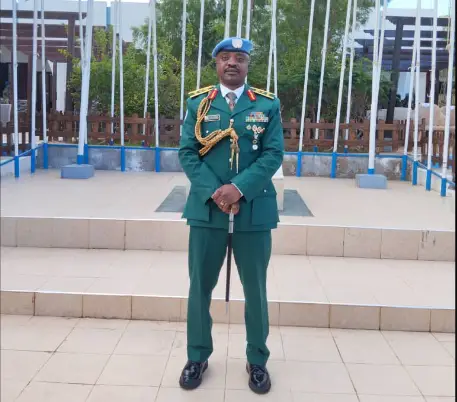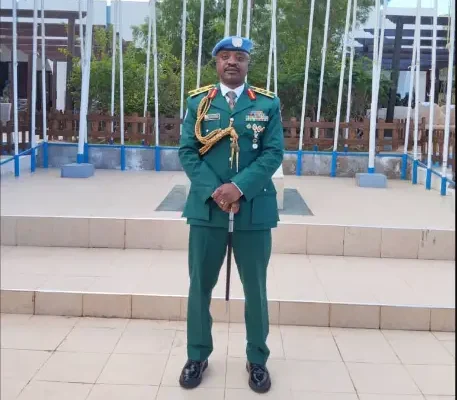
A Nigerian, Brig. Gen. Gabriel Esho, who was recently appointed as the new Deputy Force Commander of the United Nations Mission for the Referendum in Western Sahara (MINURSO), has assumed duty.
The UN correspondent of the News Agency of Nigeria (NAN) reports that Esho is the first Nigerian to stand tall as Deputy Force Commander in MINURSO.
His appointment embodies Nigeria’s commitment to global peace and security and paves the way for a more inclusive and representative future for peacekeeping missions worldwide.
This prestigious position not only marks a personal achievement for Esho but also signifies a significant milestone for Nigeria, as he becomes the first Nigerian to hold such a position within MINURSO.
MINURSO, in a statement on its website, stated a military parade was held at MINURSO HQ in Laayoune on Friday for the handover ceremony between the new Deputy Force Commander and the departing DFC Commodore Faustina Boakyewaa Anokye from the Ghana Navy.
According to the statement, the ceremony was presided over by the Special Representative of the UN Secretary General (SRSG) and Head of Mission Alexander Ivanko in the presence of the Force Commander, Major-General MD Fakhrul Ahsen.
In his speech, the SRSG hailed the brilliant work of Anokye in MINURSO and awarded her the UN medal in recognition of her excellent service.
The event was marked by the handing over of a symbolic baton from Anokye to her successor, Esho, under the supervision of the Force Commander, Major-General MD Fakhrul.
The Nigerian Army, in a post on its X account, @HQNigeriaArmy, described the appointment of Esho as a groundbreaking moment for Nigeria and Africa.
“Undoubtedly, his appointment will serve as an inspiration to aspiring Nigerian military personnel and young individuals across Africa.
“His appointment not only embodies Nigeria’s commitment to global peace and security but also paves the way for a more inclusive and representative future for peacekeeping missions worldwide.
“With Brigadier General Esho at the helm, MINURSO will undoubtedly see a renewed spirit and an empowered force working towards peace and reconciliation in Western Sahara.”
Reflecting on his accomplishments, Esho expressed deep gratitude for the support he has received.
He emphasised the importance of diversity within global peacekeeping missions, stating that representation is essential for meaningful and lasting change.
Esho’s appointment as Deputy Force Commander not only recognises his exceptional military skills but also highlights the UN’s commitment to diversifying its peacekeeping forces.
As Brigadier General, Esho’s priority will be to strengthen the mission’s mandate and ensure the safety and well-being of the local population in the Western Sahara.
His vision for MINURSO includes actively engaging with the Sahrawi people, fostering dialogue, and promoting trust within the communities. Esho firmly believes that sustainable peace can only be achieved through understanding and collaboration.
Esho hails from Ondo State in western Nigeria. From a young age, he showed great determination and an unwavering commitment to serving others, which led him to pursue a career in the military.
After graduating from the prestigious Nigerian Defense Academy as a member of 46th Regular Course with an honorary degree in mathematics and a masters degree in strategic studies, his dedication and exceptional leadership qualities quickly garnered attention.
Throughout his career, Esho displayed fierceness, resilience, and a remarkable grasp of strategic military operations.
His ability to think on his feet and a deep understanding of complex regional dynamics made him a natural choice for various peacekeeping missions across Africa.
His stellar track record soon captured the attention of the United Nations, which recognised his incredible potential and appointed him to MINURSO.
MINURSO was established by the UN Security Council in 1991 with the primary objective of overseeing the referendum on self-determination for the people of Western Sahara.
The mission has long been regarded as one of the most challenging, yet crucial, peacekeeping operations in the world. (NAN)

Comments